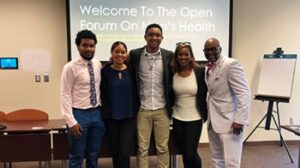Source: School of Nursing

Jade Burns (fourth from left) and organizers at the first men’s community health forum.

Jade Burns (fourth from left) and organizers at the first men’s community health forum.
Over the last year, assistant nursing professor Jade Burns, has been leading community-centered research in Detroit as part of a dynamic project to improve health education, access and outcomes for young Black men in urban communities.
Before COVID-19, her project, Young Men’s Health Matters, relied on in-person interaction to gain a deeper understanding of the community’s most pressing health care concerns. But in light of social distancing guidelines, Burns has drawn on her expertise at the intersection of technology and health care to adapt her approach. Those efforts, combined with a heightened awareness of health disparities and racial injustice, have broadened the scope of her work, creating new opportunities for a comprehensive conversation on Black men’s health.
Burns has worked with Detroit’s youth for more than 15 years in a variety of clinical, community-based and academic capacities. Her research focuses on using technology and digital spaces to improve access to health care services for adolescents and young adults, specifically young Black men and other youth of color, with an enhanced focus on sexual health.
Last year, Burns received grants from the Detroit Urban Research Center and the Institute for Research on Women and Gender for the Young Men’s Health Matters project. Through the establishment of a powerful community–academic partnership, the project aims to improve the well-being of young Black men by identifying barriers and facilitators to their health care.
Burns and her DRB Lab partnered with Detroit Community Health Connection, a federally qualified health center that provides primary care services through seven different locations throughout Detroit. Burns, who used to work as a DCHC health care provider, remembers an earlier promise to return to the center and serve the community with a new mission.
“I told them, ‘When I get my Ph.D., I’m going to come back to you, and we’re going to work together,’” she recalled. “I’ve served this community as a clinician, and now it’s time to create research that includes the community so they can benefit. I’m very passionate about that.”
Read more here.

